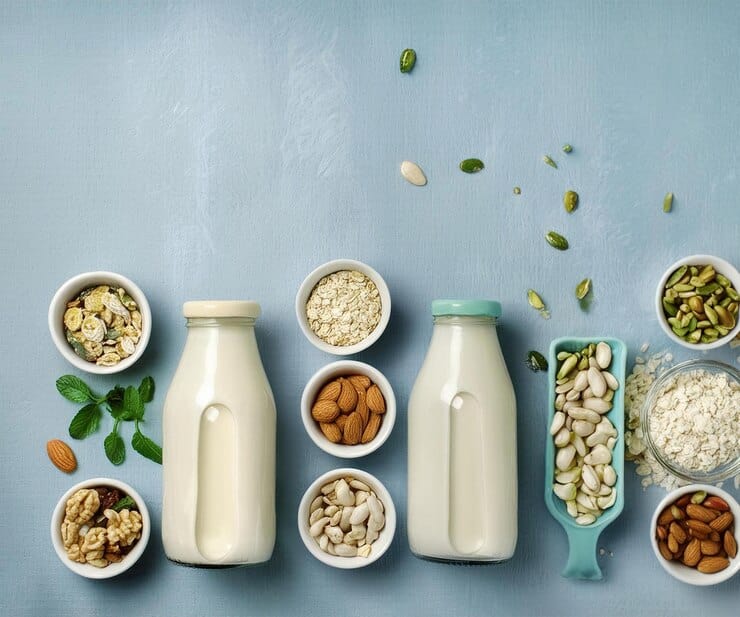Are you a vegan or lactose intolerant individual searching for the perfect milk alternative to complement your cereal? Tired of looking at alternatives to put in cereal when out of milk? Look no further! We’ll delve into the world of vegan milk and uncover the best plant-based options for your morning bowl.
For vegans and those avoiding dairy, cereal often presents a unique challenge. While many plant-based milks are suitable, some stand out as particularly delicious and nutritious options. Oat milk and soy milk have emerged as popular choices for cereal, each offering distinct benefits.
From creamy oat milk to nutty almond milk, we’ll explore the top contenders and their unique qualities. Whether you’re seeking a healthy and sustainable choice or simply a delicious alternative, we’ve got you covered. So, let’s dive in and discover the best vegan milk for your cereal cravings!
Plant-Based Milk Alternatives Comparison: Which Tastes Most like Milk on Cereal?
- Oat milk: Often considered the closest taste to dairy milk, especially when used in cereal. It offers a thicker texture and a more neutral flavor compared to nut-based alternatives.
- Soy milk: Another popular choice with a creamy and neutral taste. It can be a good substitute for dairy milk, especially in cereal.
Note: While these options are the closest to dairy milk, individual preferences and brand variations can significantly impact taste and quality.
Key factors to consider:
- Brand: Big-name brands like Oatly, Califia Farms, and Ripple often have better taste and quality, but store-brand options can also be surprisingly good.
- Texture: Oat milk tends to have a thicker texture more similar to dairy milk, while nut-based alternatives like almond or coconut milk may have a more watery consistency and a noticeable nutty flavor.
- Flavor: Soy and oat milk generally have a more neutral taste, while nut-based milks often have a distinct nutty flavor.
- Cost: Soy milk is generally more affordable than oat milk.
- Convenience: Sticking with one type of milk can be more convenient than buying multiple cartons of different alternatives.
Ultimately, finding the best plant-based milk alternative for your cereal is a matter of personal preference and experimentation.
Vegan Alternatives to Dairy Products
Soy Milk vs. Cow’s Milk
Nutrient | Soy Milk | Cow’s Milk |
Protein | 7 grams per serving | 8 grams per serving |
Sugar | Typically lower, especially unsweetened | Higher |
Saturated fat | Lower | Higher |
Calcium | Similar or higher | Similar |
Vitamin A | Similar or higher | Similar |
Iron | Similar or higher | Similar |
Oat Milk vs. Other Plant-Based Milks
Nutrient | Oat Milk | Other Plant-Based Milks (e.g., Almond, Rice) |
Protein | Lower | Generally higher |
Fortification | Often fortified with vitamins and minerals | May or may not be fortified |
Calories | Similar to cow’s milk | Lower |
Note: The specific nutritional breakdown can vary between brands and products. It’s essential to read the labels carefully to make informed choices.
Best Non-Dairy Milk for Cereal
Soy milk is often preferred for its versatility, affordability, and neutral flavor. It’s suitable for various uses, including cereal, baking, cooking, tea, and coffee. While it may have a slightly higher price tag, oat milk is often praised for its taste and creamy texture. It’s particularly good for cereal, especially chocolatey varieties.
For light granola, muesli, or bran flakes, almond or hazelnut milk can add a refreshing nutty flavor.
Ultimately, the best non-dairy milk for your cereal is a matter of personal preference. Experiment with different options to find the one that suits your taste and dietary needs.
Why Choose Vegan Milk?
Choosing the right plant-based milk for your cereal can significantly enhance your breakfast experience. Delve into the factors to consider when selecting the best vegan milk and popular options with their unique characteristics.
Ethical and environmental reasons
The dairy industry often involves cruel factory farming practices, with animals kept in confined conditions. Dairy production contributes to greenhouse gas emissions, particularly methane, which is more potent than carbon dioxide.
Health benefits
Vegan milk is naturally lactose-free, making it a suitable option for individuals with lactose intolerance. Most vegan milks are lower in saturated fat than cow’s milk.
Taste and convenience
Vegan milk is available in various flavors, including chocolate, vanilla, plain, and unsweetened. It often tastes better than cow’s milk and is produced with lower production costs.
Legal challenges
The dairy industry has lobbied for restrictions on the use of terms like “milk,” “yogurt,” and “cheese” for vegan alternatives.
Given these factors, it’s no surprise that vegan milk sales are steadily increasing while cow’s milk sales are declining.
The Importance of Choosing Nutritious Vegan Milk
When selecting vegan milk, it’s crucial to consider its nutritional content. The wide range of available options can make it challenging to determine the most beneficial choice. Here are the key nutrients to focus on:
Protein Content
Protein is a vital nutrient for building and repairing tissues. When choosing vegan milk, it’s essential to consider its protein content.
- Soy milk is generally higher in protein than other vegan milk alternatives, often offering around 7 grams of protein per serving.
- While almonds are protein-rich, almond milk typically contains significantly less protein, around 1 gram per serving.
- Coconut milk is typically very low in protein and may be considered protein-free for practical purposes.
For those seeking a higher protein vegan milk option, Ripple, made from organically grown peas, is a standout choice. Its unsweetened variety offers more protein than soy milk and is fortified with calcium, vitamin D, omega-3s, and DHA.
If you aim to increase your protein intake through vegan milk, look for brands that provide at least 5 grams of protein per serving. Always check the product label for accurate nutritional information.
Sugar Content
Many processed foods, including vegan milk, contain added sugars. Checking the nutrition label is essential to understand the sugar content. The updated Nutrition Facts label now lists both “Total Sugars” and “Added Sugars” separately. This helps consumers differentiate between natural sugars (like lactose) and added sugars. A lower percentage of added sugars per serving (5% or less) is considered low, while 20% or more is considered high.
Give unsweetened vegan milk a try and let your taste buds adjust. You may be surprised by how quickly your preferences change. Enjoying the natural flavors of unsweetened vegan milk can lead to a healthier and more balanced diet.
Calcium, Vitamin D, and Iodine Content
Most vegan milk brands are fortified with calcium, often from ground-up limestone. Aim for a brand that contains at least 300 milligrams of calcium per serving, which is typically indicated as 30% of the Daily Recommended Intake (RDI) on U.S. nutrition labels.
Cow’s milk in the United States is typically fortified with higher levels of vitamin D than vegan milk. If you’re reducing or eliminating dairy consumption, consider taking a vitamin D supplement to meet your daily needs.
Iodine can be found in iodized salt, seaweed, and multivitamins. Ensuring adequate iodine intake is crucial to prevent health issues like goiters.

Popular Vegan Milk Brands Available on Amazon
- Oatly: Known for its creamy texture and neutral taste, Oatly is a popular choice for those seeking a dairy-like experience.
- Califia Farms: Offering a variety of plant-based milks, including oat, almond, and barista blends, Califia Farms is a well-regarded brand.
- Ripple: Made from pea protein, Ripple is a high-protein vegan milk option with a smooth texture.
- Chobani: Chobani, known for its Greek yogurt, also produces a line of plant-based milks made from almonds and oats.
- Blue Diamond Almond Breeze: This Australian brand offers a variety of almond milk flavors and varieties.
Note: Availability may vary depending on your specific location and Amazon marketplace. It’s recommended to check Amazon’s website or app for the most up-to-date information on available brands and products.
FAQs
What vegan milk is best for cereal?
Oat milk and soy milk are generally considered the best vegan milk options for cereal due to their neutral flavors and creamy textures.
What is the best plant-based milk for vegans?
The “best” plant-based milk depends on individual preferences and dietary needs. Popular options include oat milk, soy milk, almond milk, and coconut milk.
What is a good substitute for milk in cereal?
Vegan milk alternatives like oat milk, soy milk, almond milk, and coconut milk are excellent substitutes for milk in cereal.
What oat milk is best with cereal?
Oatly and Califia Farms are often praised for their taste and quality when it comes to oat milk for cereal. However, personal preferences may vary.







Comments are closed.